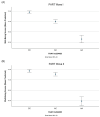Functional Variation in the FAAH Gene Is Directly Associated with Subjective Well-Being and Indirectly Associated with Problematic Alcohol Use
- PMID: 37761966
- PMCID: PMC10530831
- DOI: 10.3390/genes14091826
Functional Variation in the FAAH Gene Is Directly Associated with Subjective Well-Being and Indirectly Associated with Problematic Alcohol Use
Abstract
Fatty acid amide hydrolase (FAAH) is an enzyme that degrades anandamide, an endocannabinoid that modulates mesolimbic dopamine release and, consequently, influences states of well-being. Despite these known interactions, the specific role of FAAH in subjective well-being remains underexplored. Since well-being is a dynamic trait that can fluctuate over time, we hypothesized that we could provide deeper insights into the link between FAAH and well-being using longitudinal data. To this end, we analyzed well-being data collected three years apart using the WHO (Ten) Well-Being Index and genotyped a functional polymorphism in the FAAH gene (rs324420, Pro129Thr) in a sample of 2822 individuals. We found that the A-allele of rs324420, which results in reduced FAAH activity and elevated anandamide levels, was associated with lower well-being scores at both time points (Wave I, B: -0.52, p = 0.007; Wave II, B: -0.41, p = 0.03, adjusted for age and sex). A subsequent phenome-wide association study (PheWAS) affirmed our well-being findings in the UK Biobank (N = 126,132, alternative C-allele associated with elevated happiness, p = 0.008) and revealed an additional association with alcohol dependence. In our cohort, using lagged longitudinal mediation analyses, we uncovered evidence of an indirect association between rs324420 and problematic alcohol use (AUDIT-P) through the pathway of lower well-being (indirect effect Boot: 0.015, 95% CI [0.003, 0.030], adjusted for AUDIT in Wave I). We propose that chronically elevated anandamide levels might influence disruptions in the endocannabinoid system-a biological contributor to well-being-which could, in turn, contribute to increased alcohol intake, though multiple factors may be at play. Further genetic studies and mediation analyses are needed to validate and extend these findings.
Keywords: Pro129Thr; alcoholism; anandamide; endocannabinoid system; fatty acid amide hydrolase; happiness; rs324420.
Conflict of interest statement
The authors declare no conflict of interest.
Figures

Similar articles
-
Association of the Fatty Acid Amide Hydrolase C385A Polymorphism With Alcohol Use Severity and Coping Motives in Heavy-Drinking Youth.Alcohol Clin Exp Res. 2021 Mar;45(3):507-517. doi: 10.1111/acer.14552. Epub 2021 Feb 18. Alcohol Clin Exp Res. 2021. PMID: 33460184
-
Involvement of Endocannabinoids in Alcohol "Binge" Drinking: Studies of Mice with Human Fatty Acid Amide Hydrolase Genetic Variation and After CB1 Receptor Antagonists.Alcohol Clin Exp Res. 2016 Mar;40(3):467-73. doi: 10.1111/acer.12989. Epub 2016 Feb 9. Alcohol Clin Exp Res. 2016. PMID: 26857901 Free PMC article.
-
Severity of alcohol dependence is associated with the fatty acid amide hydrolase Pro129Thr missense variant.Addict Biol. 2018 Jan;23(1):474-484. doi: 10.1111/adb.12491. Epub 2017 Feb 1. Addict Biol. 2018. PMID: 28150397 Free PMC article.
-
Contribution of Fatty Acid Amide Hydrolase to Alcohol Use Disorder: A Systematic Review.Cannabis Cannabinoid Res. 2021 Apr;6(2):105-118. doi: 10.1089/can.2020.0158. Epub 2021 Apr 5. Cannabis Cannabinoid Res. 2021. PMID: 33989054 Free PMC article.
-
Fatty acid amide hydrolase C385A polymorphism affects susceptibility to various diseases.Biofactors. 2023 Jan;49(1):62-78. doi: 10.1002/biof.1911. Epub 2022 Oct 27. Biofactors. 2023. PMID: 36300805 Review.
Cited by
-
Genetic variation in endocannabinoid signaling: Anxiety, depression, and threat- and reward-related brain functioning during the transition into adolescence.Behav Brain Res. 2024 Apr 12;463:114925. doi: 10.1016/j.bbr.2024.114925. Epub 2024 Feb 27. Behav Brain Res. 2024. PMID: 38423255 Free PMC article.
-
Examining the association between the FTO gene and neuroticism reveals indirect effects on subjective well-being and problematic alcohol use.Sci Rep. 2024 Jul 30;14(1):17566. doi: 10.1038/s41598-024-68578-2. Sci Rep. 2024. PMID: 39080362 Free PMC article.
References
-
- CDC Well-Being Concepts. Health-Related Quality of Life (HRQOL) 2018. [(accessed on 17 September 2023)]; Available online: https://www.cdc.gov/hrqol/wellbeing.htm#:~:text=There%20is%20no%20consen....
-
- D’Agostino A., Grilli G., Regoli A. The Determinants of Subjective Well-Being of Young Adults in Europe. Appl. Res. Qual. Life. 2018;14:85–112. doi: 10.1007/s11482-017-9582-z. - DOI
-
- Boarini R., Comola M., Smith C., Manchin R., de Keulenaer F. OECD Statistics Working Papers. OECD Publishing; Paris, France: 2012. What Makes for a Better Life?: The Determinants of Subjective Well-Being in OECD Countries—Evidence from the Gallup World Poll. No. 2012/03. - DOI
Publication types
MeSH terms
Substances
LinkOut - more resources
Full Text Sources
Medical
Molecular Biology Databases

